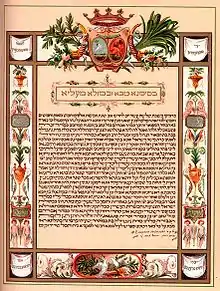Ketubot (tractate)
Ketubot (Hebrew: כְּתוּבּוׂת) is a tractate of the Mishnah and the Talmud in the order of Nashim. It deals with a variety of marital responsibilities, especially those intended for the marital contract, also named the ketubah.[1] Due to the wide breadth of subjects discussed in this tractate, Ketubot is often referred to as the Shas katan (the miniature Talmud). [2]
 An 18th century Ketubah | |
| Tractate of the Talmud | |
|---|---|
| Seder: | Nashim |
| Number of Mishnahs: | 111 |
| Chapters: | 13 |
| Babylonian Talmud pages: | 112 |
| Jerusalem Talmud pages: | 72 |
| Tosefta chapters: | 12 |
A ketubah (plural: ketubot) (in Hebrew: כְּתוּבָּה) is a special type of Jewish prenuptial agreement. It is considered an integral part of a traditional Jewish marriage, and describes the groom's rights and responsibilities towards the bride. Currently, the ketubah does not have a monetary value, however, it has legal value in Israel.[3]
Chapter headings
- Betulah Niset (בְּתוּלָה נִשֵּׂאת)
- Ha'isha Shennit'armelah (הָאִשָּׁה שֶׁנִּתְאַרְמְלָה)
- Elu Nearot (אֵלּוּ נְעָרוֹת)
- Na'arah shenitpatetah (נַעֲרָה שֶׁנִּתְפַּתְּתָה)
- Af al pi she'amru (אַף עַל פִּי שֶׁאָמְרוּ)
- Metziat ha'ishah (מְצִיאַת הָאִשָּׁה)
- Hamadir et Ishto (הַמַּדִּיר אֶת אִשְׁתּוֹ)
- Ha'ishah Shennafelu (הָאִשָּׁה שֶׁנָּפְלוּ)
- Hakotev Le'ishto (הכותב לאשתו)
- Mi Sh' Nasuy (מי ש׳ נשוי)
- Almanah Nizonet (אלמנה ניזונת)
- Hanose Et Ha'ishah (הנושא את האשה)
- Shnei Dayanei Gez' (שני דיני גז׳)
See also
References
- https://www.sefaria.org/Ketubot
- "Introduction to Masechet Ketubot". Orthodox Union. August 30, 2007. Retrieved October 14, 2018.
Due to the broad spectrum of topics covered in it, which include many subjects that are not directly related to married life, Masechet Ketubot is referred to by the rishonim as Shas katan (the Talmud in miniature) or mafte’ach ha-Shas (the index to the Talmud).
- "The Value and Significance of the Ketubah," Broyde, Michael and Jonathan Reiss. Journal of Halacha and Contemporary Society, XLVII, 2004.
This article is issued from Wikipedia. The text is licensed under Creative Commons - Attribution - Sharealike. Additional terms may apply for the media files.

